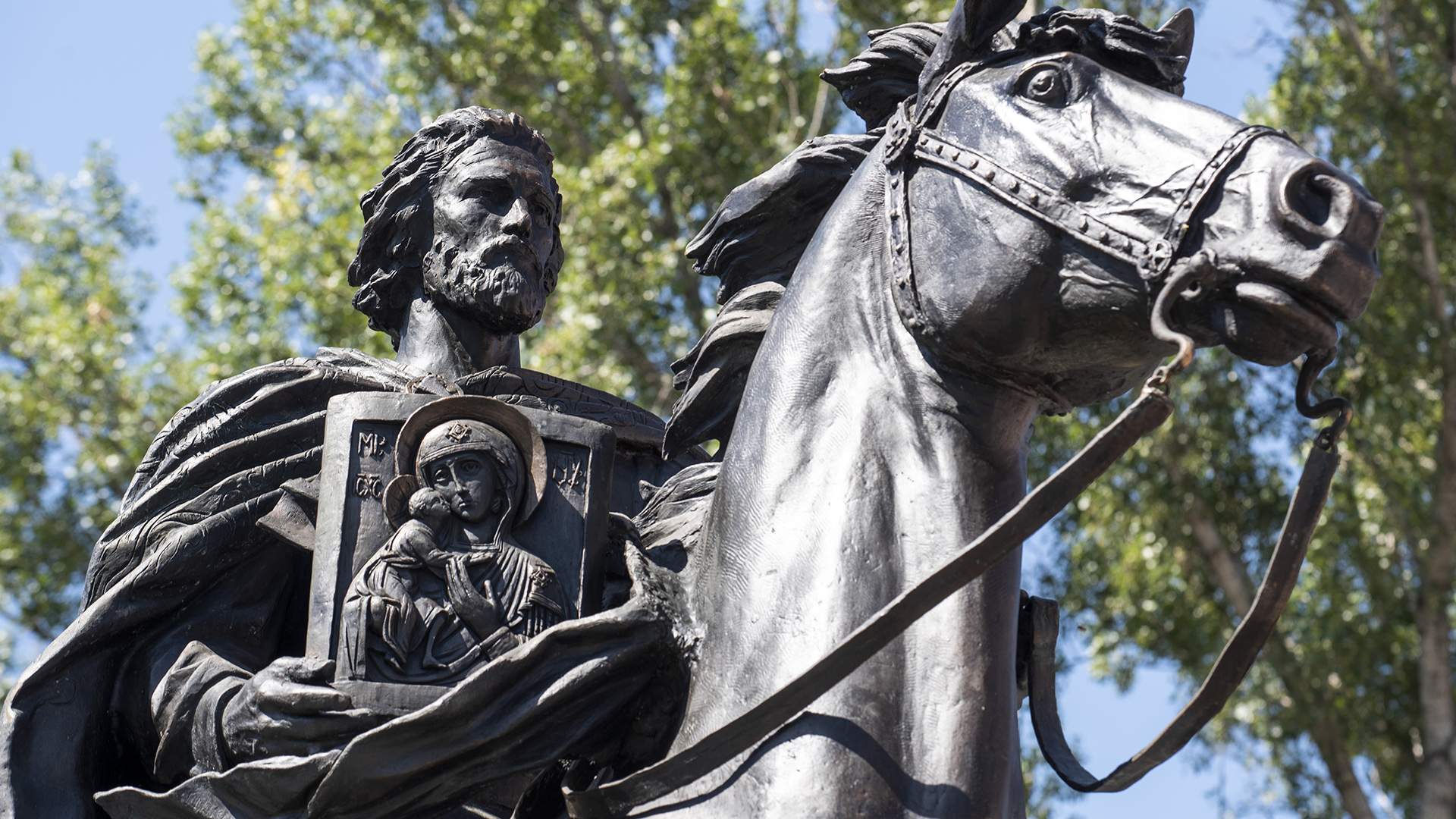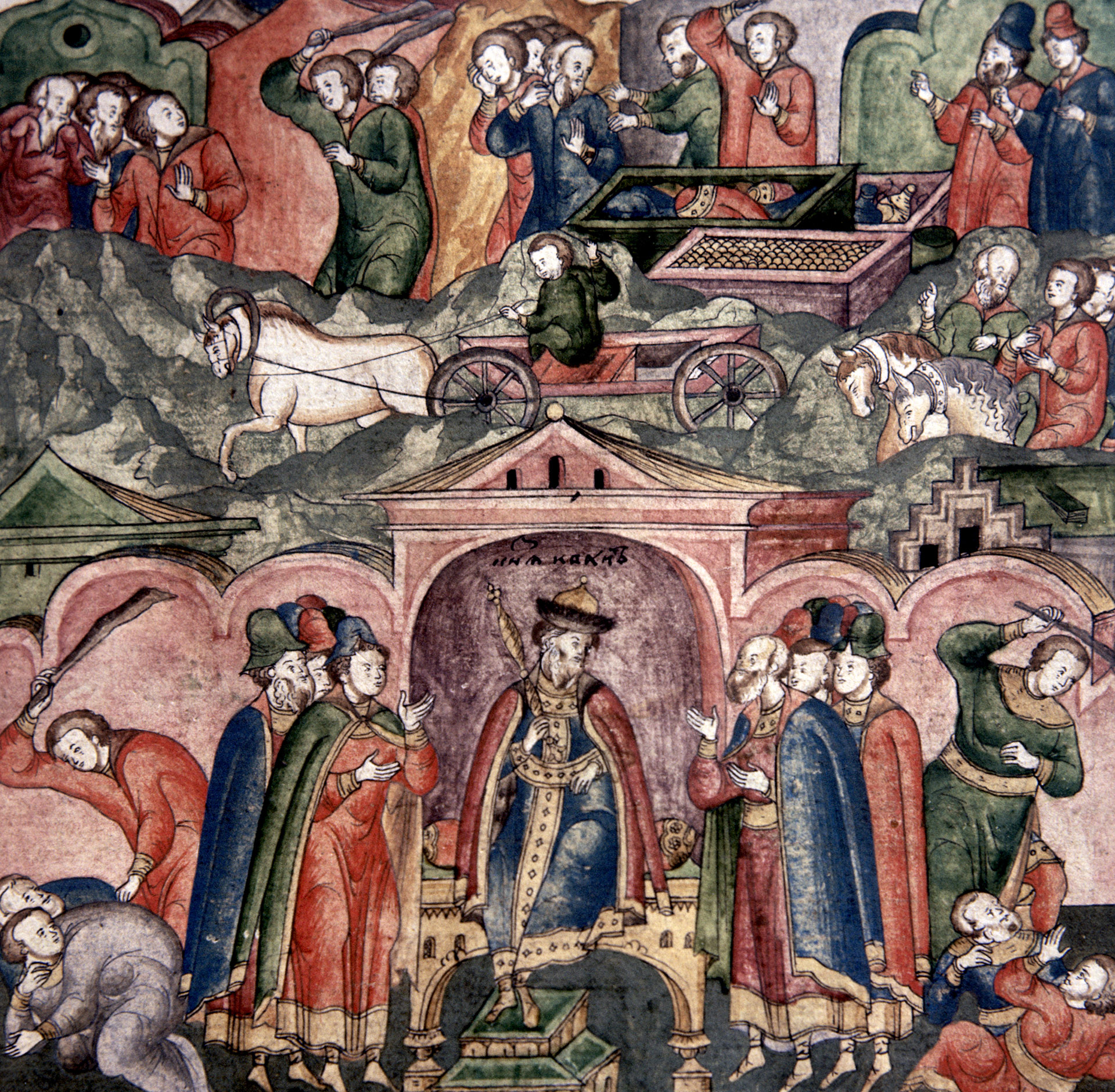"God is not in power, but in truth": how Alexander Nevsky saved Russia

On May 30, 1220, Prince Alexander Nevsky, a Russian commander, politician and saint, was born. Izvestia recalled his biography.
The young commander
He was the second son of Prince Yaroslav Vsevolodovich and his wife Feodosia Mstislavna, daughter of Mstislav Udaly. But Alexander's older brother, Fedor, died when our hero was 14. And he became the heir, a candidate for the grand duchy.
Alexander Yaroslavich's small homeland is Pereslavl-Zalessky, the city where his father reigned at that time, one of the important outposts of the Vladimir-Suzdal Principality, the largest in Russia. He was baptized in the stone Transfiguration Cathedral, he has survived to our time.
From an early age, Alexander participated in hunts and battles with his father's squad. At the age of 14, he showed his strength on the Omovzha River (in present-day Estonia), when Yaroslav Vsevolodovich's troops routed the German knights of the Order of the Sword. He wielded a heavy sword with ease and was well versed in tactics. Shortly before, Pope Gregory IX had declared a crusade against "apostates and barbarians," which included adherents of the "Greek faith." The Crusader Knights considered it their duty to enslave Russia. At the same time, they intended to profit at the expense of the Slavic peasantry, take away bread, gain access to river trade routes and capture prisoners, whom they would make their servants. Alexander's father began to fight against this wave of aggression from the West, and Nevsky devoted his whole life to this mission.
Alexander was 16 years old when his father entrusted him with the Novgorod principality. Mr. Veliky Novgorod was the largest city in northern Russia, the most important center of trade and crafts. But there, according to ancient tradition, the people's assembly and the wealthy boyars, who held trade in their hands, had more power than the prince. The latter was perceived mainly as a military leader. At that time, Alexander's main task was to build fortresses on the western borders of the Novgorod land: they became protection from predatory Lithuanian raids. And then more serious trials began, from which the young Alexander emerged with honor. In the summer of 1420, a Swedish landing force landed at the mouth of the Neva River on Novgorod land, presumably commanded by the king's son-in-law Birger Magnusson. The guards informed Alexander about this. The Prince acted decisively and quickly. Without gathering a militia, he moved towards the enemy with a small squad. He was joined by soldiers from the ancient fortress of Ladoga. "God is not in power, but in truth," the prince admonished his soldiers. At least this phrase was included in the story of Alexander's life and became a popular one. On July 15, Alexander's cavalry, led by the prince, attacked the Swedish camp. The names of the heroes of the battle have been preserved — Gavrila Aleksich, Yakov Polochanin, the boy Savva, who broke into the "golden—domed tent" - Birger's headquarters. The battle continued until late in the evening, and by morning the Swedes had set sail for their land. The Swedes failed to organize a joint campaign against Novgorod with the Livonian Order, and the young Prince Alexander Yaroslavich received the nickname Nevsky for this victory.
A year later, the situation became even more dramatic. Alexander was expelled from Novgorod, and the Livonians occupied Pskov and threatened the entire Novgorod land. Alexander was once again called to reign on the shores of the Volkhov, in a city that was called "Lord the great," and he slowly organized a rebuff to the conquerors. First, he occupied the Koporye fortress, defeated the troops of the Estonians, who acted in concert with the Livonians, and liberated Pskov. Finally, on April 5, 1242, Alexander's retinue, assisted by his brother Andrei with his Suzdalians, defeated the "knight brothers" and their Estonian allies in a stubborn battle. The battle proved decisive. Soon the Livonians sent envoys to Novgorod "with a bow" for peace talks.
It is significant that Alexander achieved these victories when the Mongols ruled in most Russian principalities, having just passed through Vladimir and Kievan Rus in a destructive whirlwind. Alexander showed that Russia is alive and capable not only of defending itself, but also of beating the enemy.
At the same time, the Novgorod boyars were always wary of the prince. Apparently, they felt that he would grow into a firm and domineering ruler. Alexander did not manage to stay on the Novgorod throne for a long time.
A life-saving compromise
Prince Alexander Yaroslavich had to live in the darkest times, when Russia became dependent on the Mongol conquerors. In addition, the civil strife between the princes-descendants of Rurik did not stop, and the Western armies, Lithuanian, Swedish, Livonian, aimed at the weakened Russian principalities...
Alexander managed to stop the invasion from the West, their expansion to Novgorod, Pskov, and in the future — to Vladimir and Ryazan Rus. Not only because he defeated the Swedes and Germans. Alexander demonstrated to his neighbors that in Russia, even after defeats from the Mongols, strong power, political will and military remained.
A talented and brave commander, he turned into a compliant diplomat when he had to establish relations with the Mongol conquerors, Batu Khan— the ruler of the Jochi ulus, which would soon transform into the Golden Horde. He understood that it was impossible to fight the Mongols on equal terms. And he did everything to preserve the traditions of Russia and the Orthodox faith as the basis of national identity. In 1249, Alexander Nevsky received a label in the Horde for the Grand duchy of Kiev, and three years later for Vladimir. He did everything to ensure that non-Mongol Baskaks ruled Russia, but in return he had to become a "junior partner" of the Khans.
Alexander was criticized and criticized: he fought for power, including with his brother Andrei. He went to bow to the khans. According to some reports, he even fraternized with Khan Sartak — and became the "sworn son" of Batu. His opponents criticized him for such diplomatic maneuvers: the Mongols remained committed to paganism, and it was inappropriate for a Christian to get so close to them. But his political line proved to be saving for Russia.
Alexander Nevsky outlined a path to rebirth for Russia — to preserve the Orthodox faith and the power of the descendants of Rurik, to remain the "junior ally" of the Horde, to accumulate forces, to stop fratricidal strife between the Russian principalities, and to strive for centralization. After another trip to the Golden Horde, the prince died at the age of 43. "The sun of the Russian land has set!" said contemporaries.
The Great Posthumous Fate
Shortly after the death of the prince, he became a symbol of political wisdom and military courage and a model for future rulers of Russia. His strategy allowed our ancestors to win the wars for the Horde inheritance and assemble a great power, and the image of the prince has remained and remains one of the key ones for Russian statehood for centuries.
It was also important that one of his sons, Daniel, became the founder of the dynasty of princes of Moscow, and his grandson, Ivan Kalita, turned Moscow into the religious center of Russia and paved the way for the revival of our statehood. From these princes there is a direct road to their descendants, the tsars of Moscow, to the last descendants of Rurik on the throne. Back in the 13th century, The Tale of the Life and Courage of the Faithful and Great Prince Alexander was created, the most important literary monument of its time, which largely determined the ideology of the revival of a united and sovereign Russia.

In 1547, under Metropolitan Macarius, Alexander Yaroslavich was canonized as a miracle worker. However, the Church primarily values not his military victories, but the feat of Christian humility, meekness and patience "above courage."
Prince Alexander became a model for our first emperor, Peter the Great. The city, founded on Zayachy Island, was named in honor of Saints Peter and Paul, but Peter considered Prince Alexander Nevsky primarily to be his heavenly patron. Peter even issued a decree forbidding Alexander to be depicted on icons in a monk's habit. The emperor believed that the "grand ducal robes" would emphasize the saint's status as the patron saint of the ruling royal dynasty and the new capital, as a far-sighted and powerful politician. In the Russian Empire, he was revered as the "Ross of the zealous defender." And the main shrine of St. Petersburg has become the relics of the holy prince, which are kept in the Alexander Nevsky Lavra. "It's true to say: there was no more beautiful face in the world, and there was also no daredevil anywhere opposite Alexander," the poet Lev Mey wrote already in the 19th century.
"Whoever comes in with a sword..."
For us, the image of Alexander Nevsky is also connected with the art of the Soviet era. Sergei Eisenstein's film, in which Nikolai Cherkasov played the role of the prince, gave a new impetus to the national veneration of Alexander Yaroslavich. The authors of the film found precise, aphoristic words for the finale of the picture. "Go and tell everyone in foreign lands that Russia is alive. Let them come to visit us without fear... But if anyone comes to us with a sword, he will die by the sword! The Russian land stands and will stand on it!" There is no historical evidence that Alexander said anything like that. This is the creative insight of Pavlenko, the screenwriter of the film. But here it is a reinterpreted gospel quote, which he certainly knew: "Those who take the sword will perish by the sword." And most importantly, the meaning of this monologue corresponds to the policy of Alexander Yaroslavich. There is no falsehood here.
Pavel Korin's painting and wartime posters are no less remarkable... In them we see a warrior and a politician, a defender of the Fatherland, a knight without fear or reproach. It is symbolic that the Order of Alexander Nevsky, in various versions, existed in both imperial and Soviet Russia. It still exists today — it is awarded both for military exploits and for civil services to the Motherland.
The descendants never forgot the warrior Prince. Temples and monuments dedicated to him are still being torn off in our time. The Alexander Nevsky phenomenon continues through the centuries. The politician and warrior who acted eight centuries ago remains a living story for us. Yes, when such a period passes, history inevitably becomes not only a document, but also a legend. But the life of Prince Alexander Yaroslavich unites us with the same strength. Alexander Dumas is right, who said during a trip to our country: "Russians worship the history of their country. There is a great future in this reverence for the past." It is no coincidence that in 2008, at the nationwide Internet voting "The Name of Russia", which was accompanied by a series of television shows, Alexander Nevsky was recognized as the most significant figure in Russian history. First of all, as a ruler who showed the country the path to rebirth and a strategy that has helped our people for centuries. He remains for us a symbol of valor and statesmanship. The prince's posthumous fate continues, and it is perhaps even more important than his lifetime exploits and decisions.
The author is the deputy editor—in-chief of the magazine "Historian"
Переведено сервисом «Яндекс Переводчик»








